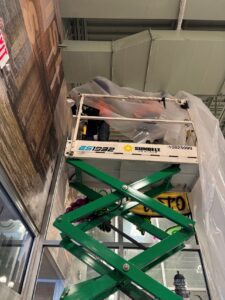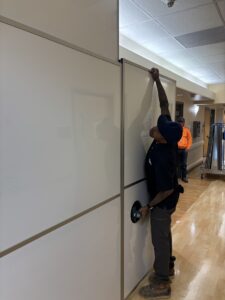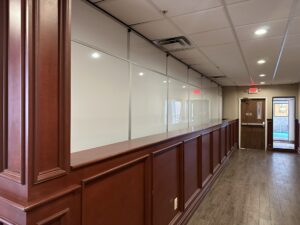Modular Wall Systems: Benefits and Applications for Contractors
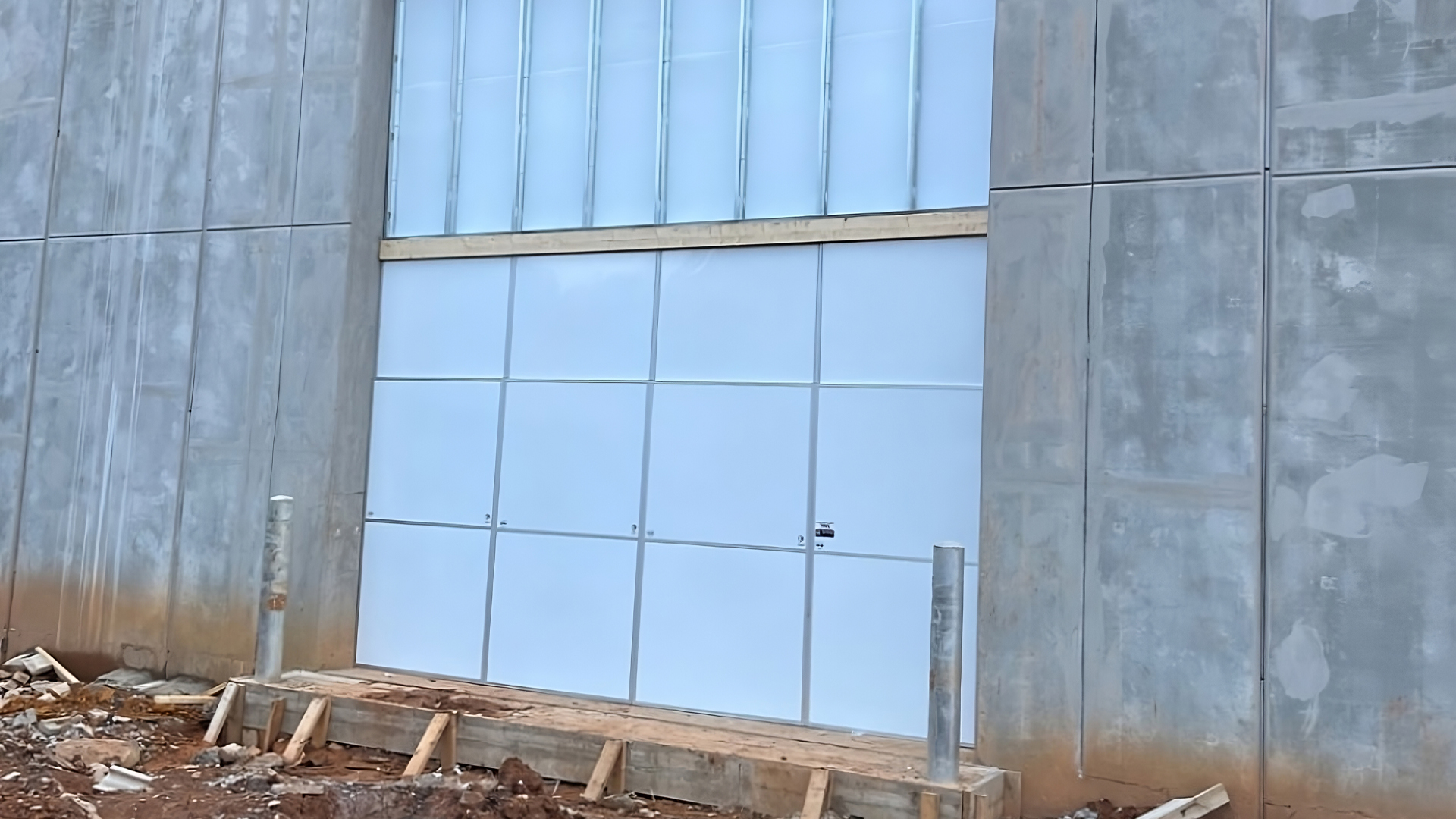
The demand for modular wall systems is on the rise for both temporary and permanent structures, indoors and outdoors alike. Versatile, durable, and eco-friendly, they’re a practical and convenient solution in a variety of commercial spaces, including healthcare facilities, retail stores, and corporate offices.
Perhaps one of the most valuable applications for modular walls is serving as temporary construction walls during construction and renovation projects as an alternative to traditional solutions like drywall and plastic barriers. For contractors and facilities managers looking for an effective dust containment solution, it’s worth exploring modular walls for not only their ability to control dust but other advantages as well.
What is a Modular Wall System?
Modular wall systems consist of pre-engineered panels that are designed to be easily assembled and installed. Depending on the system, installers can configure walls of various sizes and shapes using interlocking mechanisms or brackets that allow for easy installation and disassembly. In addition to their ease of installation, they offer benefits such as versatility, cost-effectiveness, and aesthetic appeal.
Modular walls have a wide range of applications across various industries and settings, including:
- Interior partitions in commercial spaces, offices, retail stores, and healthcare facilities
- Room dividers for event venues, convention centers, hotels, and conference rooms
- Privacy barriers in healthcare facilities, spas, fitness centers, and public spaces
- Outdoor enclosures, such as patio enclosures, pool enclosures, or restaurant outdoor dining spaces, for providing privacy and aesthetic appeal
- Retail fixtures, displays, and product showcases inside retail spaces
- Temporary construction walls that help contain dust, debris, and noise while ensuring safety and minimizing disruptions
And the list goes on — the uses of modular walls are limited only by the imagination.
Given the highly competitive nature of the commercial construction market and the growing importance of sustainability, there’s a strong incentive for contractors to find more efficient, cost-effective, and greener construction materials and methods.
With all the advantages they offer, it’s not surprising modular walls have become the preferred method of temporary containment for construction contractors and facilities managers.
Benefits of Modular Wall Systems for Construction and Renovation Sites
It’s important to note that not all modular wall systems are created equal. Manufacturers are continually improving features and engineering new technologies, leading to an ever-growing product line. The quality, cost, and adaptability of modular walls runs the gamut and depends on the materials they’re composed of. The most highly rated systems are composites of materials such as polycarbonate, aluminum, galvanized steel, and glass.
Below we’ll walk you through the benefits of high-grade systems that are on par with the products we use at Temporary Wall Systems — as opposed to lower-grade modular panels, such as those made of polycarbonate.
We recommend barriers framed in anodized aluminum with panels constructed from aluminum and galvanized steel with a closed cell insulation interior. This ensures a long-lasting product and minimal disruption for occupants.
1. Convenience and Speed
Speed of installation is arguably the most valuable benefit of modular wall systems, which are specifically designed for quick assembly. A full-service rental company can erect or disassemble walls in just a couple of hours, saving contractors significant time compared to traditional drywall barriers, for example.
Planning on installing modular walls on your own? They’re designed for easy assembly by small crews, with the use of little to no tools, shaving hours off project time. In fact, most systems can be erected in less than three hours by just one person.
As mentioned earlier, many systems are reusable, which means the walls must be cleaned and stored between uses. By renting modular systems from a full-service company that takes care of everything from assembly to removal, contractors and facilities managers can reduce labor and costs.
2. Dust and noise containment
Modular wall systems provide airtight containment of dust and debris within construction areas, increasing cleanliness and reducing health risks. Some temporary modular panels are specially engineered to reduce noise by up to 50 percent with features like insulated interiors and core panels. These benefits are particularly important in environments where noise restrictions or air quality regulations need to be followed. This means businesses such as restaurants, hotels, and retail stores can remain open for business during renovations.
3. Sustainability
Modular wall systems are a superior choice for contractors and facilities managers looking to meet sustainability standards. Designed to be reusable over a long life span, modular panels can be easily dismantled, relocated, and reassembled for different projects. By avoiding the need for new construction materials with each project, they reduce waste and promote resource conservation.
Temporary modular wall systems can also be installed and dismantled more quickly compared to traditional construction containment methods such as drywall barriers and without generating debris that ends up in landfills, thereby reducing environmental impact.
4. Infection Control
In addition to dust, active construction sites have the ability to release airborne particles and infectious pathogens. This is a concern particularly in healthcare environments, where contractors must adhere to ICRA (Infection Control Risk Assessment) guidelines to mitigate the risk of infection.
Many temporary modular wall systems are engineered to meet or exceed the highest class of ICRA safety requirements for healthcare facilities. They can also be paired with negative air machines and HEPA filters to meet safety requirements for temporary negative pressure rooms and decontamination chambers.
5. Aesthetics
Many modular walls are designed with aesthetics in mind and can be easily cleaned between projects. This is especially important when temporary construction barriers are visible to guests, customers, or tenants in commercial facilities that keep their doors open during construction and remodeling projects.
6. Cost
Modular barriers may initially seem more expensive, however traditional drywall barriers also involve significant costs — for materials, labor, waste removal, and disposal. Considering the accumulated time and cost savings across multiple projects, modular systems can end up costing less compared to assembling drywall.
Modular wall systems are an investment with a strong return, but they aren’t for every budget. If you’re on the fence about modular wall systems due to budget constraints, here are some savings considerations to keep in mind:
- Renting is a smart way to reap the benefits of modular walls while avoiding upfront investment and long-term storage costs.
- Overall project waste reduction can lower dumpster costs and other removal expenses.
- Quick and simple assembly may mean lower labor costs at the start and finish of projects.
7. Ease of Cleaning and Sanitization
Many modular walls are designed to facilitate easier cleaning, making them superior to plastic barriers which may never recover their brand-new look. They are relatively sanitization-friendly, which is particularly important in healthcare spaces. Ease of cleaning depends ultimately, however, on the materials, finishes, and design of the wall system.
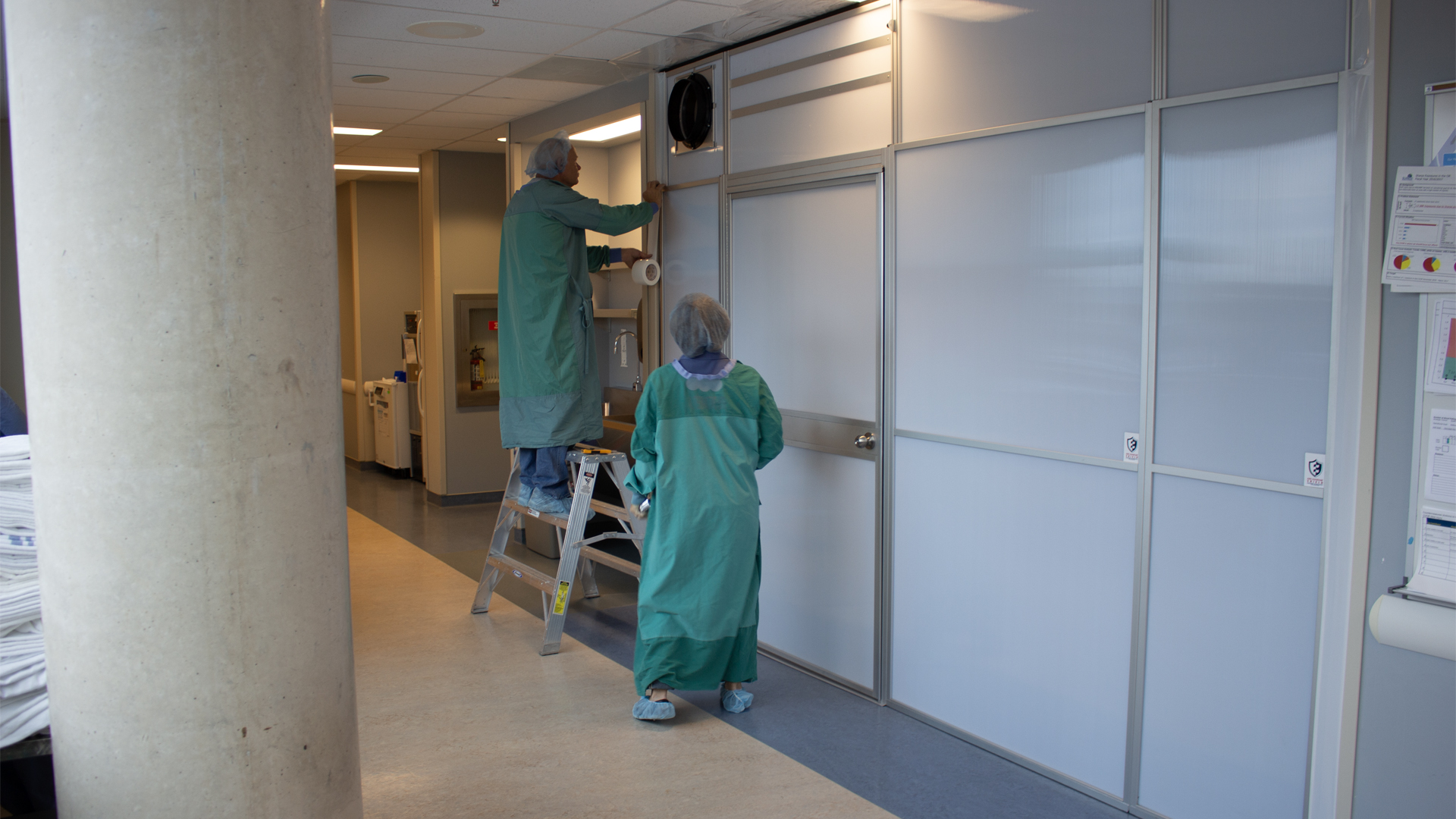
Industry Applications
Given their versatility and customizable features, modular wall systems are used as construction containment barriers across various industries and in spaces of all kinds and sizes. Keep reading to learn more about some of the most common applications.
Healthcare
As the healthcare industry steadily expands to meet growing populations, the coming years promise a constant stream of construction and renovations projects that must meet ICRA containment standards.
To properly apply ICRA guidelines and ensure all containment measures are met, project managers need to identify:
- The type of construction project
- The patient population that’s at risk
The answers to these questions determine which ICRA category — I, II, III, IV, or V — must be adhered to. As mentioned above, many modular wall systems on the market are well-equipped to exceed class IV requirements. They can also be used for ICRA-required negative pressure and decontamination rooms.
Schools, Colleges, and Universities
Modular walls ensure that learning can continue uninterrupted during campus construction and renovation projects. They can be used to create temporary classrooms or administrative offices, or as temporary barriers sectioning off construction zones from student and faculty areas.
Hospitality and retail
In the retail and hospitality industry, it’s critical for businesses to remain open during renovation projects while still meeting health and safety standards and providing a positive customer experience. Modular walls make this possible by providing an effective dust and noise containment solution and visually appealing barriers.
Labs and Cleanrooms
With their superior containment and thermal control properties, high-end modular wall systems enable scientific research, pharmaceutical manufacturing and packaging, and other laboratory or cleanroom work to continue with minimal impact to business operations while ensuring the health and safety of facility occupants.
Airports and Public Transportation
Airport construction is a common sight as service areas are being overhauled to meet the latest travel protocols for the new normal, including entry/exit health screenings, table and seating spacing, and ventilation and air conditioner safety standards. Undergoing these expansions and renovations is no small task — especially when the goal is to remain invisible to travelers and employees. Modular walls are a rising solution in these spaces thanks to their quick assembly and breakdown times, dust and noise containment, and attractive appearance.
Telecom and Data Centers
Telecom and data centers are stacked with top-of-the-line equipment that functions around the clock, providing valuable services to businesses and individuals. In such an environment, it’s imperative for facilities managers to protect this critical technology from dust and inconsistent temperatures during construction and renovation projects. This makes airtight, insulated modular panels an ideal fit for such spaces.
Offices and Commercial Spaces
With the steady flow of professionals and customers in and out of offices and commercial buildings, it’s critical for facilities to remain safe and distraction-free. Modular walls allow businesses in these spaces to conduct “business as usual” thanks to their airtight containment, sound attenuation, and modern real-wall appearance.
Full-Service Rental Solutions for Modular Wall Systems
It’s clear from their benefits and applications that modular wall systems are a more versatile and convenient containment solution compared to traditional construction barriers. This makes them an option worth considering for your next construction or renovation project, no matter the type of space.
At Temporary Wall Systems, we understand the needs and challenges of an active renovation or construction project. We’re dedicated to providing temporary containment solutions that are safe, clean, and environmentally responsible, yet durable enough for rigorous day-to-day operations.
From installation to removal for projects big or small, our team of experts manages everything, for temporary containment systems that are: Rented. Delivered. Installed. Removed. Contact us for an estimate today.
